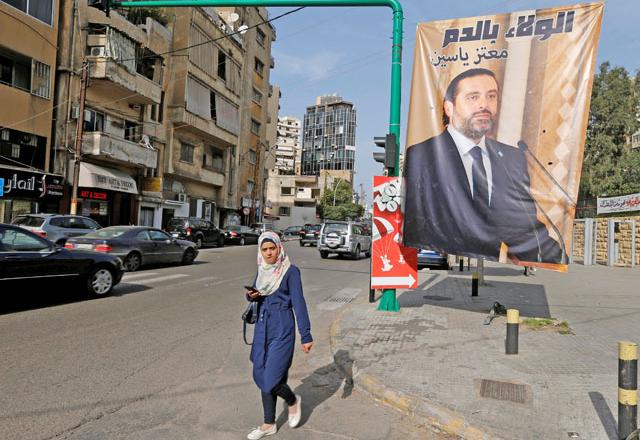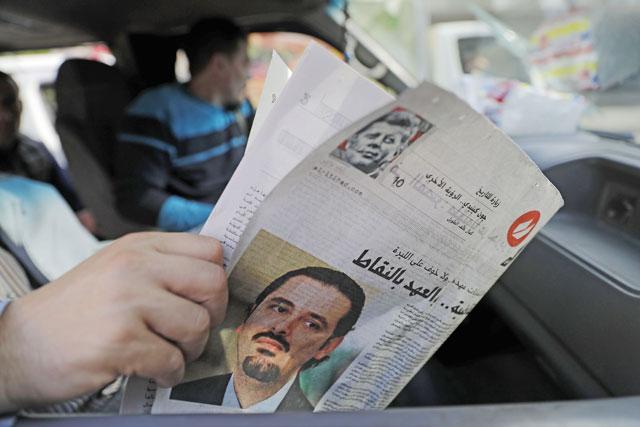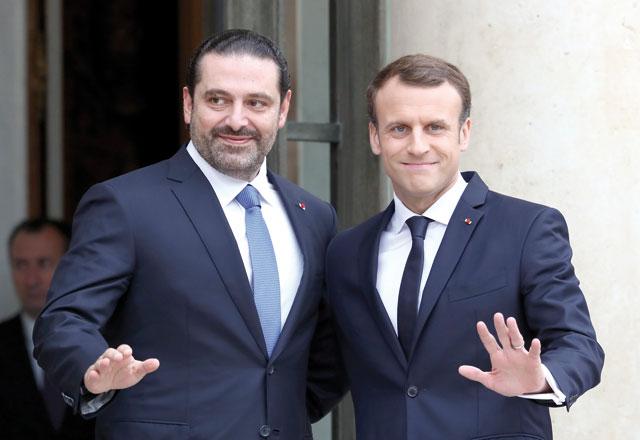You are here
Lebanon’s Hariri back as army enters restive border town
By AFP - Aug 09,2014 - Last updated at Aug 09,2014
BEIRUT — Lebanon’s leading Sunni politician Saad Hariri returned from self-imposed exile Friday on a trip to bolster the country’s army after clashes with jihadists in the latest spillover from Syria’s war.
Hariri’s visit, his first since 2011, comes after open conflict between the army and jihadists on the border with Syria that has killed 17 troops and left 19 kidnapped.
Hours after his arrival, a military source said troops had begun entering the restive town of Arsal for the first time since the fighting erupted a week ago.
Hariri’s trip follows his announcement that Saudi Arabia, one of his chief allies, would give $1 billion to shore up the army and security forces against jihadists.
His return to Lebanon also underscores the seriousness of the clashes in the Arsal region in eastern Lebanon on the Syrian border.
Fighting that began there on August 1 has eased, and a military source said Friday night that the army has “started to enter” Arsal, setting up a checkpoint and advancing slowly.
But earlier, residents who tried to return to their homes were fired on by snipers and it remained unclear whether gunmen had withdrawn from the town.
Sunni clerics have mediated a truce under which the militants agreed to return to Syria, and talks are continuing over the release of 17 policemen and 19 soldiers being held hostage.
The violence in Arsal is the worst in the border region since the Syrian war began in March 2011.
Despite Beirut’s effort to insulate itself from the war next door, the fighting has spilled over and stoked existing political and sectarian tensions in Lebanon.
Much of Lebanon’s Sunni community, including Hariri, supports the Sunni-dominated uprising against President Bashar Assad.
But many Lebanese Shiites support Assad, and the powerful Shiite Hizbollah movement has sent fighters to bolster his troops against the uprising.
Hariri, 44, has voiced unconditional support for Lebanon’s army, but some of his constituents accuse the army of allowing Hizbollah free rein to fight in Syria and failing to protect Sunnis.
“Our choice is to support the state and to help the army and the security forces, even if some mistakes have been made,” he said in a statement Friday evening, after meeting members of his Future movement.
“If Hizbollah acts in a way that harms Lebanon, it doesn’t mean similarly mistakes should be made in response, or that the backbone of the state and its prestige should be broken,” he added.
Hizbollah is Hariri’s chief political rival, with several of its members accused of assassinating his father, former prime minister Rafiq Hariri in 2005.
The party’s representatives also brought down Saad Hariri’s government in 2011 by resigning, after which he went into exile.
His departure has left the Sunni community with little leadership on the ground, even as the Syrian conflict has stoked tensions.
Many in Lebanon, including Hariri and his supporters, accuse Hizbollah of embroiling the country in Syria’s war by fighting alongside Assad.
But Hizbollah says it is fighting next door to prevent the spread of extremist Islamists into Lebanon.
$1 billion in Saudi aid
The fighting in Arsal erupted last Saturday afternoon, when gunmen attacked soldiers after the arrest of a Syrian man accused of belonging to Al Qaeda’s Syrian affiliate Al Nusra Front.
It prompted army chief General Jean Kahwaji to urge France to speed up delivery of weapons being bought under a $3 billion deal financed by Saudi Arabia.
On Wednesday, Hariri announced the new $1 billion in Saudi aid, and he said Friday he was working with the government and military on how best to disperse the money.
Analysts said Hariri’s trip was intended to rally the Sunni community around the army and bolster his standing in Lebanon.
“Hariri’s return can be seen as an attempt at unifying the Sunni community both around Lebanese state institutions, particularly the army, as well as around Saudi Arabia, which is now championing itself as a major counterterrorism force in the region,” said Lina Khatib, director of the Carnegie Middle East Centre.
“Such a rallying of Sunnis would have a stabilising effect on the country and detach the Sunni community from being attracted to the extremism presented by groups” such as the Islamic State, she said.
Khatib added that Hariri was also “striving to regain a central political standing in Lebanon as the country looks forward to holding parliamentary and presidential elections”.
Related Articles
BEIRUT — Lebanese President Michel Aoun, who has refused to accept Saad Hariri's resignation as prime minister unless Hariri returns from Sa
BEIRUT — Lebanon's outgoing prime minister, Saad Al Hariri, made a brief visit to the United Arab Emirates from Saudi Arabia on Tuesday desp
PARIS — Prime Minister Saad Al Hariri said he will return to Lebanon for Wednesday’s Independence Day celebrations and explain his situation



















